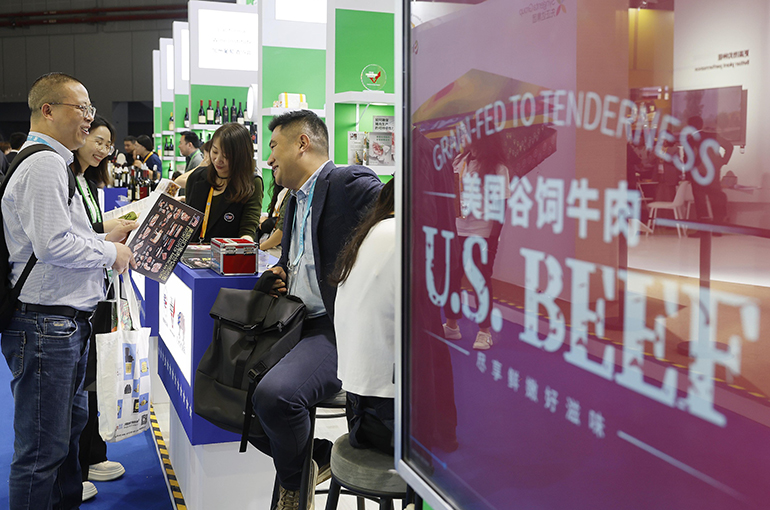 US Firms Are Split on China as Regulatory Gains Clash With Tariff Worries, AmCham Report Shows
US Firms Are Split on China as Regulatory Gains Clash With Tariff Worries, AmCham Report Shows(Yicai) Sept. 10 -- China's five-year business outlook looks mixed to US companies operating in the world’s second-largest economy, as the regulatory landscape is quickly improving but long-term confidence is falling because geopolitical tensions and tariffs are creating deep uncertainty, according to the findings of a new survey.
About 48 percent of the 254 firms surveyed by the American Chamber of Commerce in Shanghai said China's regulatory environment is transparent, up from 35 percent a year earlier, while the share of those confident that the country will open up further nearly doubled to 41 percent, according to the annual China Business Report published by the business organization yesterday.
In addition, around 34 percent said that Chinese government policies and regulations toward foreign companies have improved in the past few years, an increase from 30 percent.
However, a record-low of just 41 percent are upbeat about the five-year business outlook in China, down from 47 percent a year ago and the fourth consecutive annual decline. Around 37 percent are pessimistic or slightly pessimistic.
"Government efforts to improve the regulatory environment have been noticed by members, but they are overshadowed by US-China trade tensions," said Jeffrey Lehman, chairman of AmCham Shanghai.
Trade Woes
US-China tensions remain the top concern, with about 64 percent expecting new tariffs to weigh on their annual revenue this year. A record-low of only 45 percent anticipate income growth this year.
Manufacturers are the hardest-hit US firms, with 74 percent expecting annual revenue to drop as a result of tariffs. By sector, chemicals producers reported the largest impact at 88 percent, due to their reliance on highly globalized supply chains and critical materials subject to export controls, followed by logistics companies at 83 percent, as they face disruptions as businesses adjust sourcing and manufacturing in response to the shifting trade environment.
The survey did indicate some positive signs, with around 71 percent of respondents reporting profits last year, up from a record low of 66 percent in 2023, while 57 percent saw increasing revenue.
The survey was conducted between the middle of May and June, capturing sentiment months after US President Donald Trump raised import tariffs in April, which included a 34 percent duty on Chinese imports. The impact is particularly acute for companies with integrated US-China supply chains, hitting them from both sides.
"If you continue to import, bring inputs from the US in a significant way, you will be hit by the countermeasure on the Chinese side," noted Eric Zheng, president of AmCham Shanghai. “If you export your products to the US market, you'll be hit by high tariffs from the US side. So it's both sides.”
Shifting Investment
The ongoing trade uncertainties are also reflected in US firms' business plans in China, with investment decisions increasingly driven by geopolitics rather than local conditions.
Among those cutting investment, 63 percent cited "uncertainty about US-China trade policy and the broader commercial relationship" as a key factor, up from 53 percent a year earlier.
The cautious stance has led to a tangible shift in global supply chains, with a record-high 26 percent reducing their investment in China last year, while 25 percent plan to do so this year. Around 47 percent have already redirected planned investment from China to other locations, with Southeast Asia being the preferred destination for half.
Beyond tariffs, US companies face tougher competition from increasingly competent Chinese rivals, with 63 percent noting competition from local firms as their second-biggest operational challenge, behind only US-China trade tensions.
The accelerating pace of artificial intelligence development is reshaping the competitive landscape, as about 41 percent said that Chinese rivals are ahead in adopting AI technologies.
Policy Stability Call
Despite challenges, US companies still view China as a strategically important market. Nearly half urged the US government to remove all tariffs on Chinese goods, while 42 percent called on China to eliminate retaliatory duties on US imports.
The business community warns that further tariff escalation could be damaging. Some 69 percent of companies expect a negative effect if the US revokes China's Permanent Normal Trade Relations status, with manufacturers bearing the brunt.
"While some firms are exploring alternative supply chains for enhanced diversification and resilience, China remains a critical part of their global strategy," said Jeff Yuan, head of tax at PwC China.
Editor: Martin Kadiev